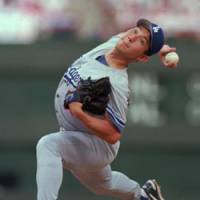Hideo Nomo's impact on baseball will be felt for decades to come.
His initial success with the Los Angeles Dodgers in 1995 made Major League Baseball scouts and general managers see the truth: Nippon Professional Baseball had improved by leaps and bounds in the 30 years since pitcher Masanori Murakami, the first Japanese to play in the majors, left the San Francisco Giants and returned to Japan.
Credit Nomo, who officially retired Thursday, for taking a giant leap of faith — and being bold at the same time. He broke the strangle-hold NPB's owners had on their players, retiring from the Kintetsu Buffaloes (smart move, a precursor to the posting system) and embarking on a journey to play in the United States.
Credit the Dodgers for giving him a chance.
And remember this: More than any other individual, Nomo ushered in a new era of baseball. The game truly became global during his prime.
His 123-109 record in the majors, highlighted by two no-hitters (one in each league), two strikeout titles (one in each league), a superbly deceptive forkball and a famous "tornado" windup produced enough highlight reels to fill a shoe box full of DVDs. His competitive drive was something special, too.
"Hideo Nomo was a trailblazer," former Dodgers manager Tom Lasorda, a Hall of Famer, told The Associated Press. "He represented himself and his country to the highest degree of class, dignity and character.
"I am so proud of all he did for Japanese players."
It would only be appropriate for Ichiro Suzuki, Kosuke Fukudome and Kenji Johjima to publicly express their appreciation for Nomo in the days to come. Similar words should be spoken by So Taguchi, Hideki Matsui, Kazuo Matsui and other current or former Japanese players in the majors.
Why?
Nomo made it possible for them to garner lucrative multimillion dollar contracts in the majors.
In fact, Nomo's initial success with the Dodgers made it possible for the concept of the World Baseball Classic to get serious consideration. The rest is history.
Think back to 1994, the year of baseball's now-infamous strike. The future of the sport looked pretty bleak, and the World Series was canceled because of bickering owners and players.
Those were dark days for the sport.
A year later, Nomomania was the buzz word and a key element of the weekly highlight shows in the United States and Japan. It was something special to see the tall right-hander's uncanny delivery and a 13-6 record that forced you to pay attention, forced you to hear his startling statements: Yes, I will excel in the big leagues. I will make a true impact.
"He was a workhorse as a pitcher," Lasorda told AP, reflecting on his days as Nomo's skipper. "Nobody alive today can throw a no-hitter in Colorado, and he did. He won the Rookie of the Year, and helped the Dodgers win the division in 1996.
"I know he will be inducted into the Japanese Hall of Fame, and certainly hope he is inducted into the National Baseball Hall of Fame. He is a pioneer, and he deserves all the recognition in the world."
Indeed, Nomo had a magnificent career.
He won 10 or more games in 11 seasons. He pitched 200 or more innings eight times. He struck out 200 or more eight times, including 287 in back-to-back seasons to begin his career (1990-91) with the Buffaloes and finished with more than 3,000 Ks, a benchmark total for strikeout artists. And he kept trying to prolong his career, making comeback after comeback in the past few seasons even though his best days as a top-level athlete were behind him.
Frankly speaking, I wanted to see Nomo return to Japan for one or two years and help a team here win the Japan Series, pitching a shutout in the title-clinching game. (Now that would've been a once-in-a-lifetime article to write.)
Instead, Nomo's career ended abruptly but not unexpectedly. His 18.69 ERA over 4 1/3 innings earlier this season with the Kansas City Royals is only a footnote to his lasting legacy.
One of my favorite memories of Nomo came late in his career. I was sitting in the press box in Phoenix, watching the Dodgers and Diamondbacks play on July 1, 2002 (thanks to Google I was reminded of the exact date of that game). Nomo was vying for his seventh straight victory, a game against the defending World Series champion. The atmosphere at the ballpark was electric, providing an appropriate atmosphere for the National League West rivals.
Nomo picked up the win that night, yielding just five hits over eight innings in a 4-0 triumph. He fanned seven batters and walked none (yep, it's always fun to watch a power pitcher work his magic).
Nomo produced the game-winning hit that game, too, an RBI double off Arizona ace Randy Johnson in the fifth inning to shatter a scoreless tie.
"Randy Johnson is a great pitcher. Just to be in the same game is a fun thing to do," Nomo told reporters after the game.
Pure and simple, Nomo, always a visual artist on the mound, made watching baseball a fun thing to do. And now he has earned a well-deserved rest.



